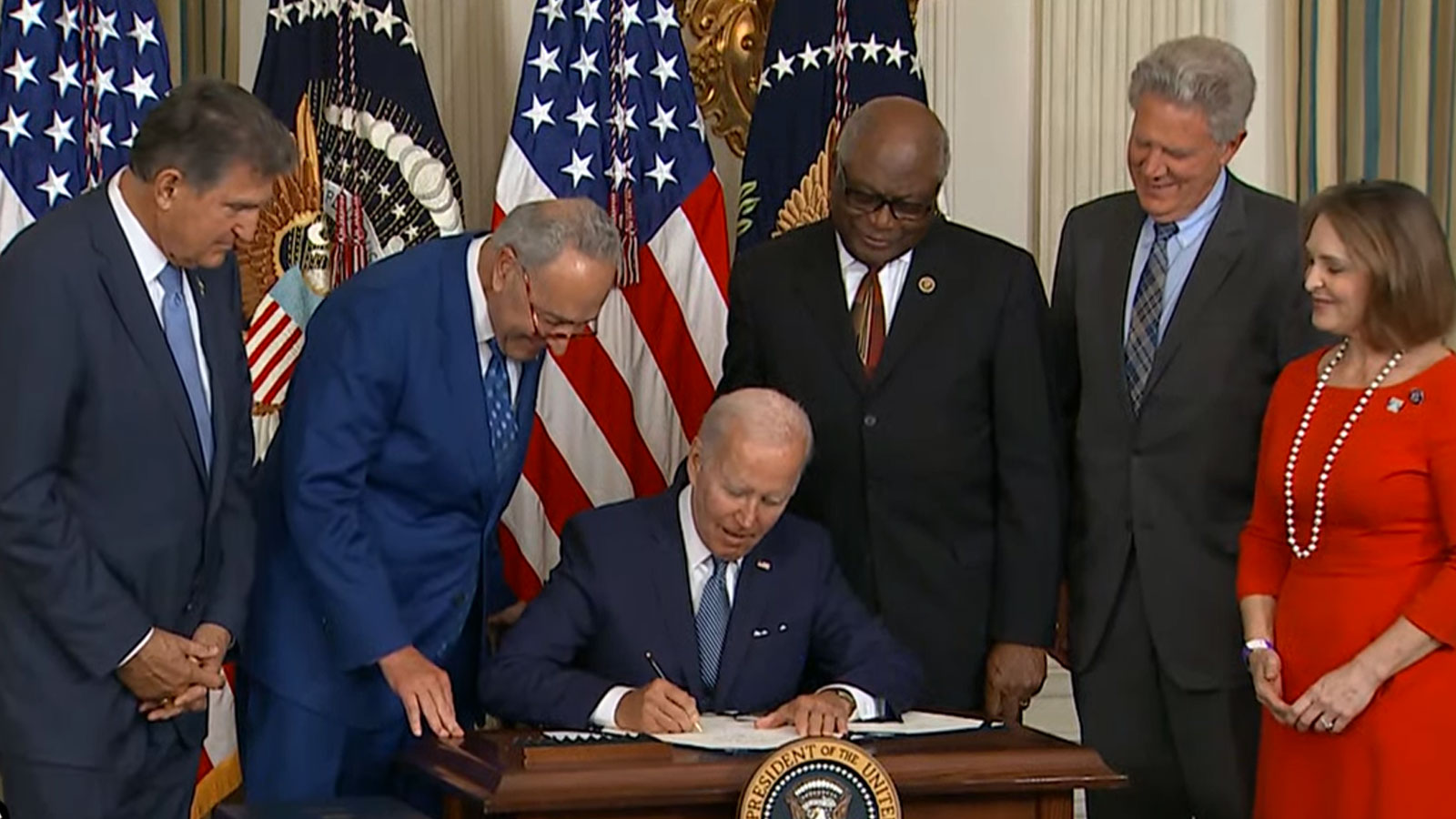Miracles indeed can happen. And sometimes do.
Such is the case with enactment of major climate legislation, part of the Inflation Reduction Act now, with President Joe Biden’s signature, enacted. Not just passed by the Senate and the House on strict party-line votes, but passed by each chamber as presented to them, without amendments, without differences requiring a time-consuming and inscrutable House/Senate conference committee. And, it must be emphasized, without a single vote by the Republican narrow minorities in both the House and the Senate
Just a month ago, you’d have not found a single talking head, pundit, highly acknowledged Washington-watcher or anyone else predicting this outcome.
Notwithstanding the somewhat Orwellian nature of its official name, “Inflation Reduction Act,” and the impacts it may or may not have in reducing inflation, its numerous and significant elements addressing the climate change challenge remain front and center. (One wonders if a more literally accurate official name might have cost a few nay votes from the narrow majority.)
The law as enacted – those mere words send a chill – is not, and let’s make this emphatic, “perfect.” Few laws ever are, and this one is no exception. That’s a point on which the most ardent climate “deniers” and the most passionate climate action advocates no doubt agree, of course for different reasons. But time is past for judging this historic legislative accomplishment on the basis of what it doesn’t do; time instead to focus on the expansive reality of what it can and may well do. Judge it by what it is, not by what it isn’t or could have been.
But that, in fact, is the point: It could not have been those things climate advocates had hoped for and still squeaked through the narrowest of margins in the Senate and a similarly scant margin in the House. Without legislators, particularly in the Senate, having made the compromises and concessions they did, there would be no enactment, not even a Senate approval. The bill the Senate actually passed, with Vice President Kamala Harris casting the decisive and tie-breaking final vote of 50-50, threaded the proverbial needle, angst over the cutting room floor be damned.
Kudos and credits for pulling off this particular miracle go far and wide, and none deserve more credit than the legions of living and past climate scientists and others who persisted in hammering home their precautions and convincing findings. For sure, Senate Majority Leader Chuck Schumer (D-New York) and oft-times called “moderate” Senator Joe Manchin (D-West Virginia), he clearly a late-bloomer, deserve credit in the end. And so too does another late-to-the-party senator, Krysten Sinema (D-Arizona), whose twelfth-hour bouts of real or feigned fence-sitting added to the drama. When it came down to it, those three senators, with strong boosts from a handful of other Senators and from their staffs – warrant a hearty hat-tip.
So too, of course, do the House leaders, and none more so than Speaker Nancy Pelosi (D-California), who helped assure a successful negotiation of the treacherous shoals that justify comparisons between watching the passing of legislation and the making of sausage.
That all facing-election House members, be they from blue, purple, or blazing red districts and states, held in lockstep is on its own a wondrous miracle.
Again, though, it’s the global body of climate scientists – strengthened by the supportive efforts of tireless and persistent climate activists young and old, domestic and global – who most deserve credit for the signing miracle on August 16.
Now comes the hard part, actually moving forward and realizing the potentials of the new law, and doing so in the most cost-effective, equitable, and time-sensitive ways. For now at least, two early outcomes of enactment of this miracle legislation put wind at the backs of those long eager to be at this stage: The new law not only provides badly needed incentives to encourage and further motivate the private sector, it also restores, and this is critical, the U.S. as credibly having standing to be a global leader in enlisting other countries to also get on board.
Think what you might about the nuances and the underlying strengths and omissions of this new law: But think also about where we’d all be headed in the absence of those incentives and that claim to a critical global leadership role for decades to come.
The climate’s ailments under the stresses of modern fossil-fuels-based civilization are no less now than they would have been without the Inflation Reduction Act. But the opportunity for changing that trajectory is, at the very least, no longer the stuff of a fitful dream, but rather of tangible and proven national law.
Miracles can and do happen. This one just did.


